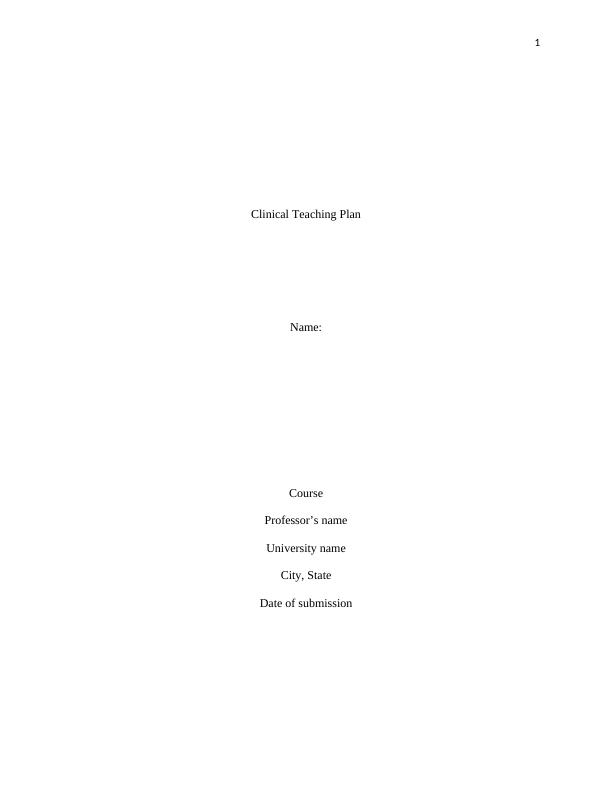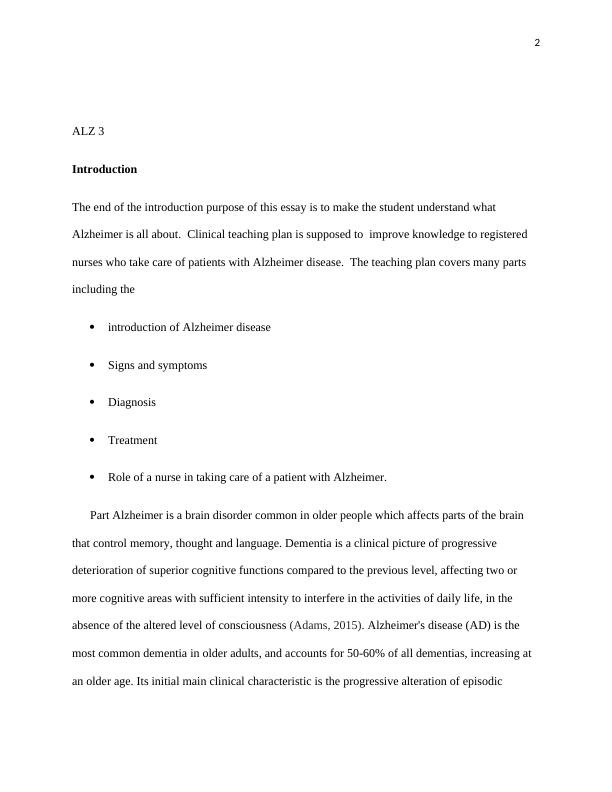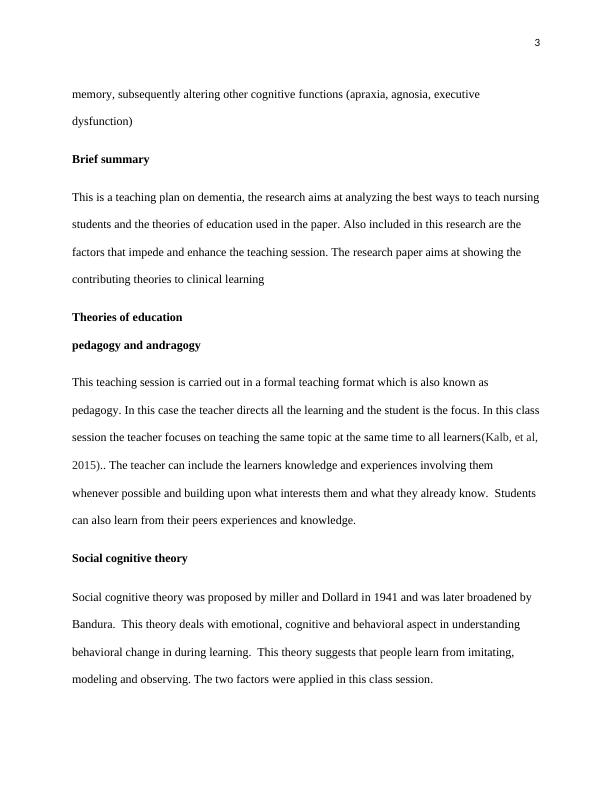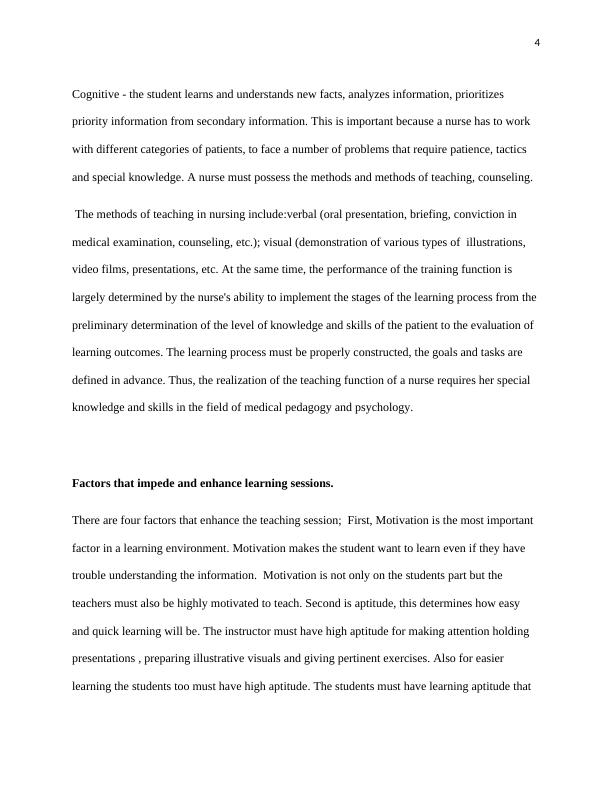Clinical Teaching Plan for Alzheimer's Disease: Symptoms, Diagnosis, and Treatment
Added on 2023-06-12
13 Pages3335 Words92 Views
1
Clinical Teaching Plan
Name:
Course
Professor’s name
University name
City, State
Date of submission
Clinical Teaching Plan
Name:
Course
Professor’s name
University name
City, State
Date of submission

2
ALZ 3
Introduction
The end of the introduction purpose of this essay is to make the student understand what
Alzheimer is all about. Clinical teaching plan is supposed to improve knowledge to registered
nurses who take care of patients with Alzheimer disease. The teaching plan covers many parts
including the
introduction of Alzheimer disease
Signs and symptoms
Diagnosis
Treatment
Role of a nurse in taking care of a patient with Alzheimer.
Part Alzheimer is a brain disorder common in older people which affects parts of the brain
that control memory, thought and language. Dementia is a clinical picture of progressive
deterioration of superior cognitive functions compared to the previous level, affecting two or
more cognitive areas with sufficient intensity to interfere in the activities of daily life, in the
absence of the altered level of consciousness (Adams, 2015). Alzheimer's disease (AD) is the
most common dementia in older adults, and accounts for 50-60% of all dementias, increasing at
an older age. Its initial main clinical characteristic is the progressive alteration of episodic
ALZ 3
Introduction
The end of the introduction purpose of this essay is to make the student understand what
Alzheimer is all about. Clinical teaching plan is supposed to improve knowledge to registered
nurses who take care of patients with Alzheimer disease. The teaching plan covers many parts
including the
introduction of Alzheimer disease
Signs and symptoms
Diagnosis
Treatment
Role of a nurse in taking care of a patient with Alzheimer.
Part Alzheimer is a brain disorder common in older people which affects parts of the brain
that control memory, thought and language. Dementia is a clinical picture of progressive
deterioration of superior cognitive functions compared to the previous level, affecting two or
more cognitive areas with sufficient intensity to interfere in the activities of daily life, in the
absence of the altered level of consciousness (Adams, 2015). Alzheimer's disease (AD) is the
most common dementia in older adults, and accounts for 50-60% of all dementias, increasing at
an older age. Its initial main clinical characteristic is the progressive alteration of episodic

3
memory, subsequently altering other cognitive functions (apraxia, agnosia, executive
dysfunction)
Brief summary
This is a teaching plan on dementia, the research aims at analyzing the best ways to teach nursing
students and the theories of education used in the paper. Also included in this research are the
factors that impede and enhance the teaching session. The research paper aims at showing the
contributing theories to clinical learning
Theories of education
pedagogy and andragogy
This teaching session is carried out in a formal teaching format which is also known as
pedagogy. In this case the teacher directs all the learning and the student is the focus. In this class
session the teacher focuses on teaching the same topic at the same time to all learners(Kalb, et al,
2015).. The teacher can include the learners knowledge and experiences involving them
whenever possible and building upon what interests them and what they already know. Students
can also learn from their peers experiences and knowledge.
Social cognitive theory
Social cognitive theory was proposed by miller and Dollard in 1941 and was later broadened by
Bandura. This theory deals with emotional, cognitive and behavioral aspect in understanding
behavioral change in during learning. This theory suggests that people learn from imitating,
modeling and observing. The two factors were applied in this class session.
memory, subsequently altering other cognitive functions (apraxia, agnosia, executive
dysfunction)
Brief summary
This is a teaching plan on dementia, the research aims at analyzing the best ways to teach nursing
students and the theories of education used in the paper. Also included in this research are the
factors that impede and enhance the teaching session. The research paper aims at showing the
contributing theories to clinical learning
Theories of education
pedagogy and andragogy
This teaching session is carried out in a formal teaching format which is also known as
pedagogy. In this case the teacher directs all the learning and the student is the focus. In this class
session the teacher focuses on teaching the same topic at the same time to all learners(Kalb, et al,
2015).. The teacher can include the learners knowledge and experiences involving them
whenever possible and building upon what interests them and what they already know. Students
can also learn from their peers experiences and knowledge.
Social cognitive theory
Social cognitive theory was proposed by miller and Dollard in 1941 and was later broadened by
Bandura. This theory deals with emotional, cognitive and behavioral aspect in understanding
behavioral change in during learning. This theory suggests that people learn from imitating,
modeling and observing. The two factors were applied in this class session.

4
Cognitive - the student learns and understands new facts, analyzes information, prioritizes
priority information from secondary information. This is important because a nurse has to work
with different categories of patients, to face a number of problems that require patience, tactics
and special knowledge. A nurse must possess the methods and methods of teaching, counseling.
The methods of teaching in nursing include:verbal (oral presentation, briefing, conviction in
medical examination, counseling, etc.); visual (demonstration of various types of illustrations,
video films, presentations, etc. At the same time, the performance of the training function is
largely determined by the nurse's ability to implement the stages of the learning process from the
preliminary determination of the level of knowledge and skills of the patient to the evaluation of
learning outcomes. The learning process must be properly constructed, the goals and tasks are
defined in advance. Thus, the realization of the teaching function of a nurse requires her special
knowledge and skills in the field of medical pedagogy and psychology.
Factors that impede and enhance learning sessions.
There are four factors that enhance the teaching session; First, Motivation is the most important
factor in a learning environment. Motivation makes the student want to learn even if they have
trouble understanding the information. Motivation is not only on the students part but the
teachers must also be highly motivated to teach. Second is aptitude, this determines how easy
and quick learning will be. The instructor must have high aptitude for making attention holding
presentations , preparing illustrative visuals and giving pertinent exercises. Also for easier
learning the students too must have high aptitude. The students must have learning aptitude that
Cognitive - the student learns and understands new facts, analyzes information, prioritizes
priority information from secondary information. This is important because a nurse has to work
with different categories of patients, to face a number of problems that require patience, tactics
and special knowledge. A nurse must possess the methods and methods of teaching, counseling.
The methods of teaching in nursing include:verbal (oral presentation, briefing, conviction in
medical examination, counseling, etc.); visual (demonstration of various types of illustrations,
video films, presentations, etc. At the same time, the performance of the training function is
largely determined by the nurse's ability to implement the stages of the learning process from the
preliminary determination of the level of knowledge and skills of the patient to the evaluation of
learning outcomes. The learning process must be properly constructed, the goals and tasks are
defined in advance. Thus, the realization of the teaching function of a nurse requires her special
knowledge and skills in the field of medical pedagogy and psychology.
Factors that impede and enhance learning sessions.
There are four factors that enhance the teaching session; First, Motivation is the most important
factor in a learning environment. Motivation makes the student want to learn even if they have
trouble understanding the information. Motivation is not only on the students part but the
teachers must also be highly motivated to teach. Second is aptitude, this determines how easy
and quick learning will be. The instructor must have high aptitude for making attention holding
presentations , preparing illustrative visuals and giving pertinent exercises. Also for easier
learning the students too must have high aptitude. The students must have learning aptitude that

End of preview
Want to access all the pages? Upload your documents or become a member.
Related Documents
Management of Alzheimer Disease: A Clinical Teaching Sessionlg...
|11
|2667
|176
Nursing Assignment on Cognitive Disorder and Dementialg...
|3
|514
|366
Assignment on the Mental Health Nursinglg...
|8
|1884
|73
Critical Reflective Report on Dementia using Kolb's Cyclelg...
|4
|706
|235
Care for Older People - Case Studylg...
|11
|3312
|26
Teaching and Learning Theories in Nursing Educationlg...
|18
|4658
|278
